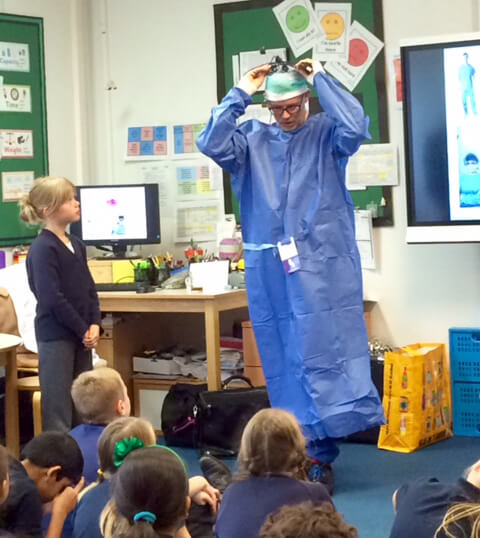Science week at my daughter’s school
A brief lesson on my field of medicine
Not too long ago, teachers at my daughter’s school organised a science week. For days on end, people tried to get pupils interested in STEM subjects, with the main area of focus being the human body. Parents who were professionally involved with the human body were cordially invited to come and teach a brief lesson. I have a vivid recollection of the pride I felt as a pupil attending a primary school in Veghel when my father told my class about his work as a neurologist. And now my 8-year-old girl wanted me to do the same for her and her classmates.
Needless to say, I immediately said yes. But to my surprise, I found while preparing my ‘lecture’ that I was considerably more nervous about this chat than about giving an official presentation at a medical conference. And I soon understood why. At a conference, people will politely listen to your story. They won’t start rioting until you start saying truly controversial things or making gigantic mistakes. Children, on the other hand, are much more straightforward. If they feel you are giving a dull presentation, they will find other ways to entertain themselves. So I was forced to consider the question: What do 8-year-old kids find interesting? How do I interact with them, and how do I make sure they don’t lose interest? How much can I interact with them before losing my train of thought?
Quiz
Once I’d asked myself those questions, I started enjoying my assignment. I structured my talk, picked some nice illustrations for my PowerPoint presentation and compiled a quiz to check whether the children had been paying attention. I was in for a special morning. I was surprised at how much the children already knew about the human anatomy. They were also familiar with a good many medical specialities. Useful questions were asked, and we even did some role-playing, replete with surgery uniforms and tools. The kids answered most of my quiz questions correctly; only a few of my questions proved too hard for them.
So, for that matter, do YOU know:
- How many brain cells a human being has?
- Which type of medical specialist performs heart surgery?
- How many cervical vertebrae a giraffe has?

A doctor’s school visit
Neurosurgery from a different point of view
In the end, I got more out of this morning than just my daughter’s admiration. It’s confronting, but very useful, to step out of your comfort zone every once in a while and take a completely different approach to your work. It stops you from getting in a rut and keeps you on your toes. I believe that communication is an undervalued aspect of a doctor’s work. I’ll even go out on a limb and say that the success of any surgical treatment largely depends on the quality of the consultations that preceded the procedure. Doctors must ‘click’ with their patients and really listen to them. They must really make an effort to understand what they are being told and explain very honestly and clearly what they can and can’t offer their patients. Even if they have to tell the same story over and over again, they must find different ways of telling it, because all patients are different. Since my presentation at my daughter’s school required me to talk about my profession with young children, I had to think carefully about what information I wanted to get across and how to go about it. But of course, doctors must be that focused every time they meet a patient. Genuine contact and respect are keywords here.
The kids in my daughter’s class thankfully didn’t start rioting during my presentation. Afterwards, they came up to me, very excited, one by one, to share their own doctor’s experiences with me. Since that day I’ve become even more aware of the importance of proper communication at the surgery. And I’m hoping that the kids in question will be less afraid of seeing a doctor from now on, because the father of a classmate they know so well turned out to be a surgeon...
Oh, and as for the answers to my quiz…
- 100 billion (yes, you, too!);
- A cardiothoracic surgeon;
- Giraffes have 7 cervical vertebrae, just like human beings.




